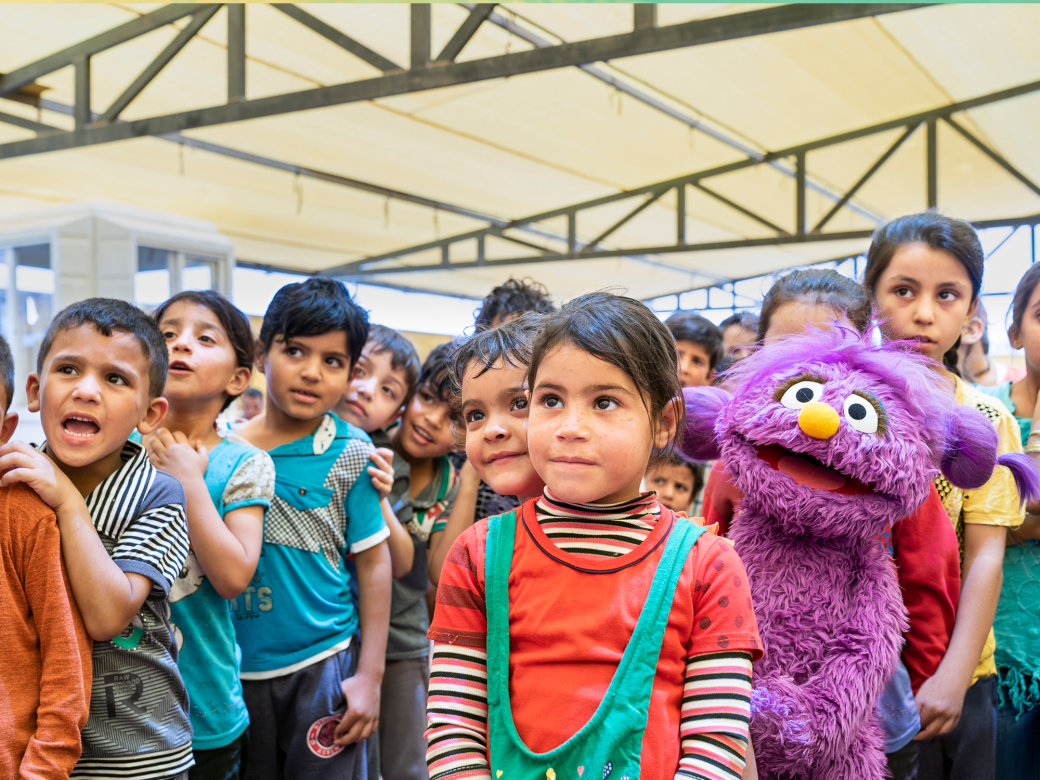
Advocating for Young Children Affected by Crisis
Harnessing the power of a trusted brand to promote support for early childhood development in crisis response globally.
Too often, the unique needs of young children and their families are overlooked in times of crisis.
Despite clear evidence that early childhood development (ECD) programming has both immediate and long-term benefits for children and their communities—and that ECD programs can provide returns of up to 13% a year through improved education, health, and economic outcomes—these interventions remain dramatically underfunded around the world.
We know that the task of supporting children and families affected by crisis far outstrips the capacity of any single organization or government, which is why Sesame Workshop harnesses the power of its beloved Muppets and trusted brand to promote broader support for early childhood development in crisis response globally. Together with our partners, we are working to influence the way that governments, donors, nonprofits, and multilateral institutions like the United Nations identify and respond to the needs of young children in crises.
To include all children, early childhood development must be a core element of the humanitarian sector’s response to crises. To translate that imperative into action, Sesame Workshop is advocating for larger and higher quality investments for young children in crisis contexts. We are working to:
Through events, communication, advocacy and engagement with decision-makers, we’re working to make sure children’s rights and needs are at the forefront of humanitarian decisions.
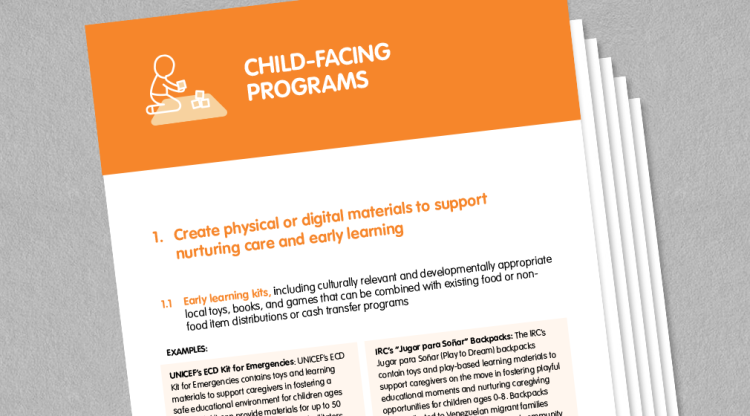
Examples of ECD programs around the world
This resource introduces types of ECD programs implemented in emergency contexts, offering a snapshot of different categories of interventions to encourage ECD in humanitarian settings as well as concrete examples of each.
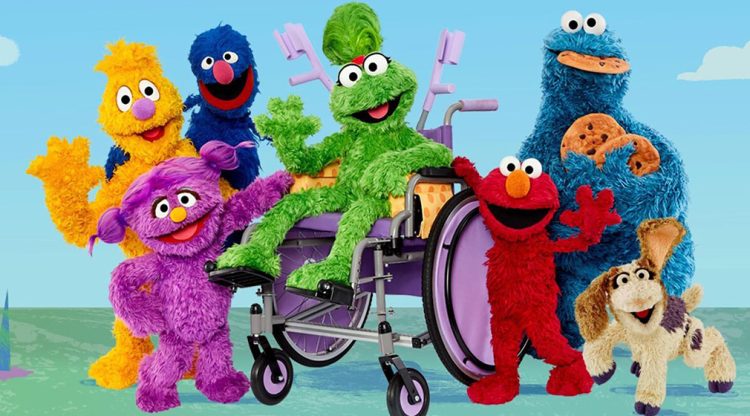
CNN Op-Ed: Aspirational or Accurate Representation?
Sesame Workshop President Sherrie Westin and UNICEF USA President and CEO Michael J. Nyenhuis wrote an op-ed about why Sesame Muppet Ameera uses a wheelchair that is not the most appropriate fit for her.
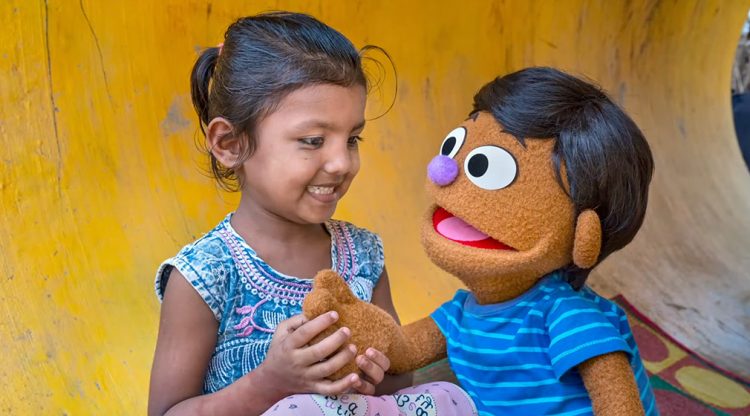
Telling Stories with Communities
This video shows how the Sesame process of creating characters and telling stories involves families at every step. Engaging with communities allows us to build powerful role models into our storytelling approach.
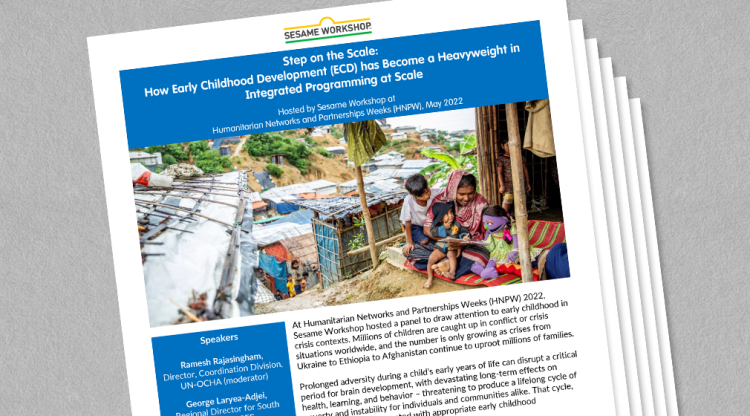
How ECD has Become a Heavyweight in Integrated Programming at Scale
At the 2022 Humanitarian Networks and Partnerships Weeks, Sesame Workshop hosted a panel on early childhood in crisis contexts.
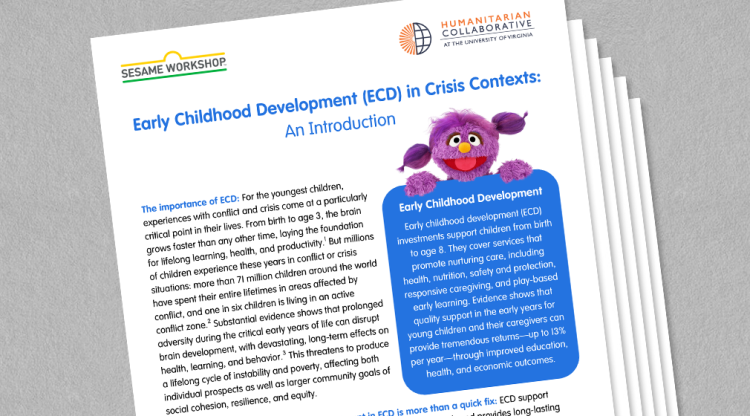
ECD in Crisis Contexts: An Introduction
This resource provides an introduction to ECD in crisis contexts—what it is and why it’s important—and presents two case studies of ECD programs in crisis contexts.
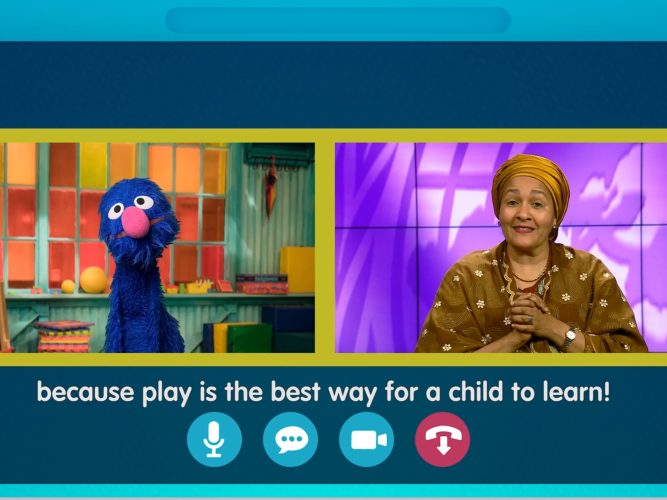
Playful Learning with Grover
United Nations Deputy-Secretary General Amina J. Mohammed joins Grover in a game of “Grover Says” to demonstrate the importance of learning through play.
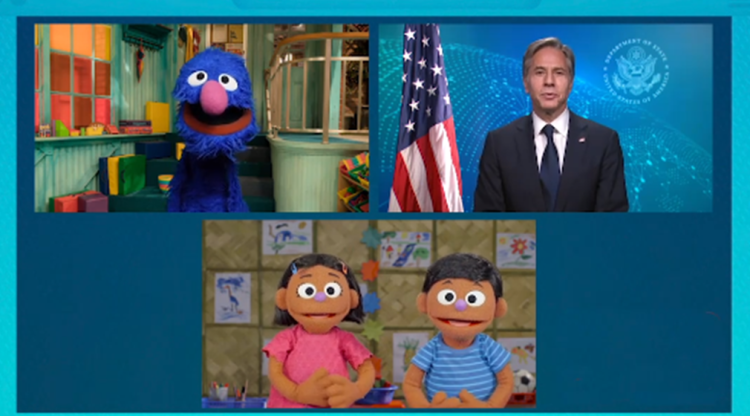
Making New Friends
United States Secretary of State Antony Blinken and his pal Grover chat with new friends Noor and Aziz about all the things they have in common—including their shared love of playful learning!
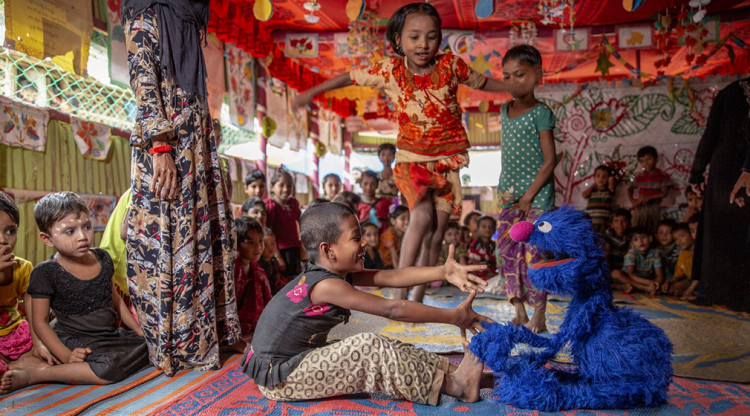
ECD to Accelerate the SDGs
United Nations Deputy-Secretary General Amina Mohammed and Sesame Workshop President Sherrie Westin co-authored this blog demonstrating the value of ECD.
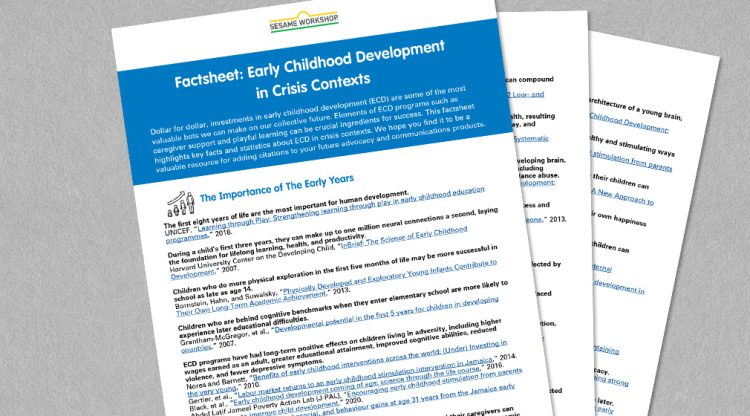
The Case for ECDiE
Dollar for dollar, investments in early childhood are some of the most valuable bets we can make on our collective future. This factsheet highlights key facts about ECD in crisis contexts and why it’s so essential.

Global Grover Interviews Leaders
At the first-ever Global Refugee Forum in Geneva in 2019, Global Grover interviewed leaders from the UN, governments, donors, and civil society.
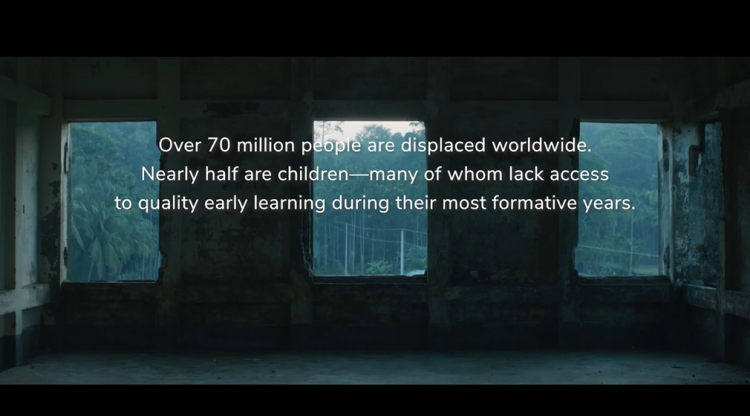
Meet Somaya
This short documentary introduces Somaya, a young Rohingya girl growing up in Cox’s Bazar, Bangladesh. She is one of 35 million children who have been forced to flee their homes worldwide.

Take a Tour
Noor and Aziz offer a look inside their favorite play space in the refugee camp where they live. Together, they share six reasons why they love to spend time in their play space.
Less than 2% of humanitarian aid funding is dedicated to early childhood development. We’re working to increase investments for children and caregivers by providing evidence of the impact of ECD programming and examples for its delivery in crisis contexts.
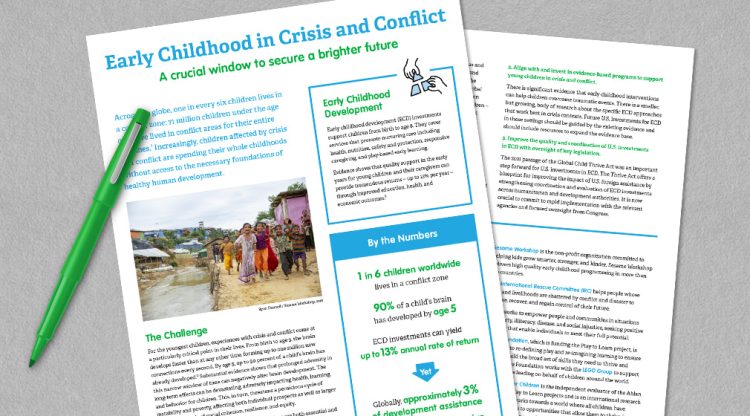
Congressional Factsheet
The United States Government has long been a generous and influential partner in protecting the health, education, and safety of children affected by crisis and conflict.
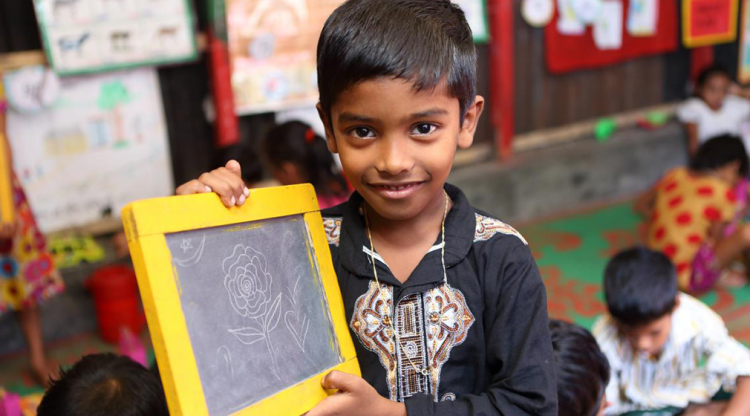
Joint Call for Action
Sesame Workshop joined UNICEF, the International Rescue Committee, and the Global Partnership for Education in this piece laying out what’s needed to make a change in investments in ECD in crisis contexts.
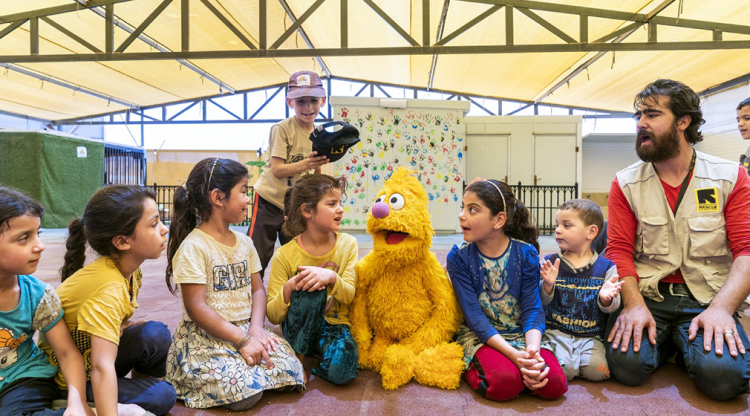
Full Steam Ahead
Sesame Workshop President Sherrie Westin and the International Rescue Committee President and CEO David Miliband mark the first anniversary of the Global Child Thrive Act.
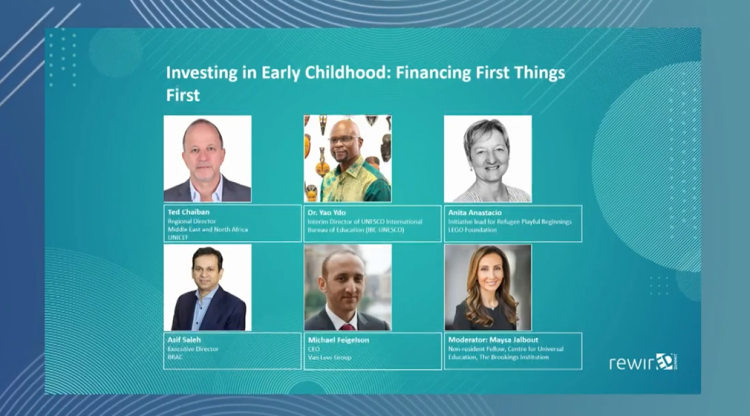
Financing First Things First
Sesame Workshop President Sherrie Westin delivers the keynote for a high-level panel on investing in early childhood development at the RewirEd Summit.
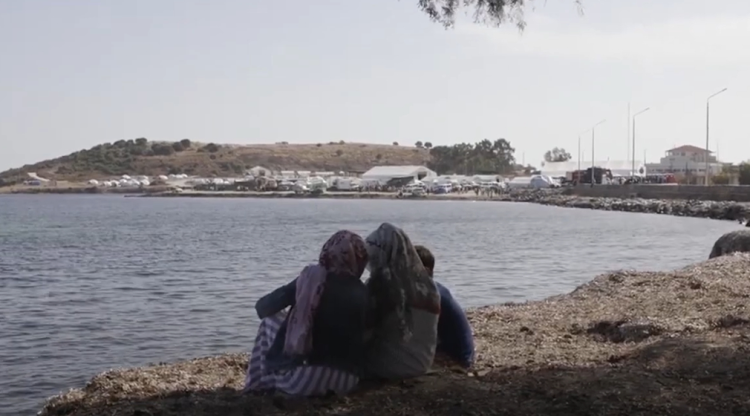
Funding for Impact
The International Rescue Committee and Sesame Workshop lay out the case for investment in early childhood development in crisis contexts.
We are working to generate and share evidence about what works to bring early opportunities to children and caregivers living through crisis and conflict.
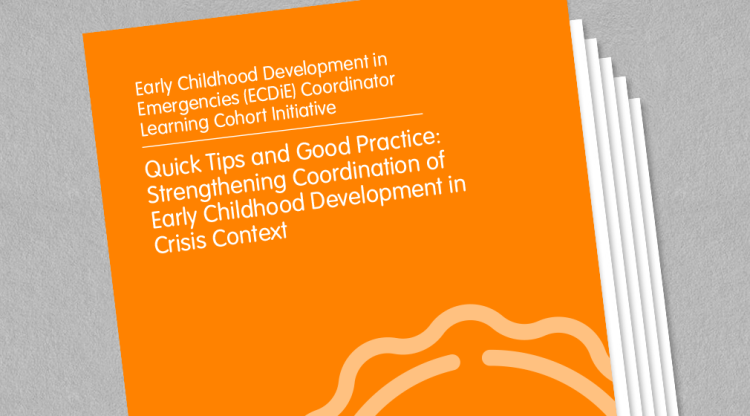
Strengthening Coordination of ECD
This guidance note offers practical tips on coordinating ECD in emergencies (ECDiE) and good practice examples provided by the ECDiE Coordinator Learning Cohort, facilitated by Sesame Workshop and the Humanitarian Collaborative at the University of Virginia (UVA). These examples and tips are intended to be applicable across a variety of crisis contexts globally.
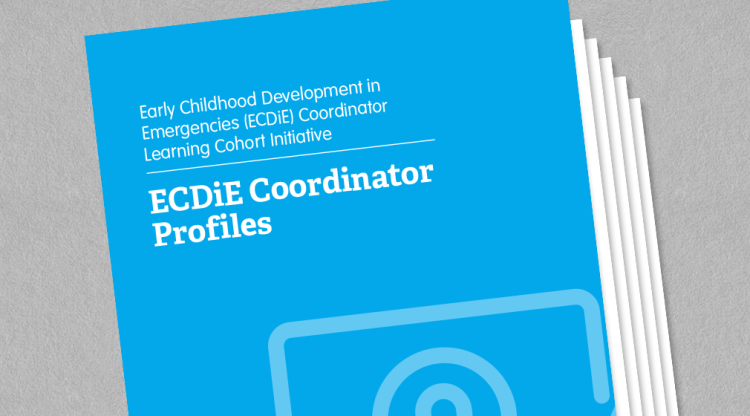
ECD in Emergencies Coordinator Profiles
These profiles describe the roles and responsibilities of the six coordinators participating in the ECDiE Coordinator Learning Cohort, offering examples of the different roles that coordinators can play at the country or crisis level to strengthen coordination of ECD within and across sectors.
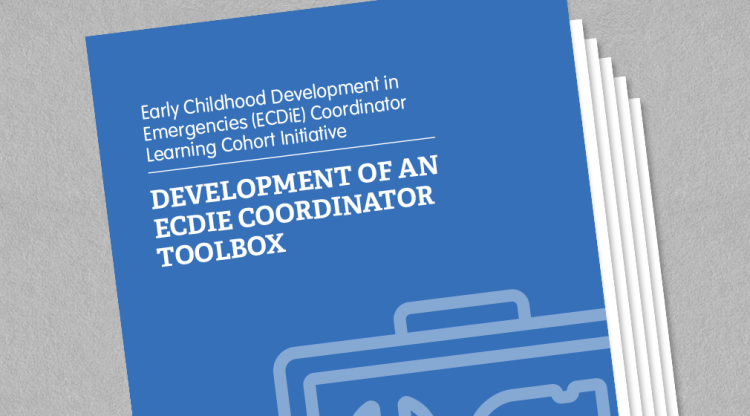
Recommendations for Developing an ECDiE Coordinator Toolbox
This report offers recommendations for the development of a toolbox that would provide resources for individuals supporting ECD coordination within and/or across sectors at the country or crisis level and strengthen collective efforts to ensure that ECDiE is more fully mainstreamed in crisis response.
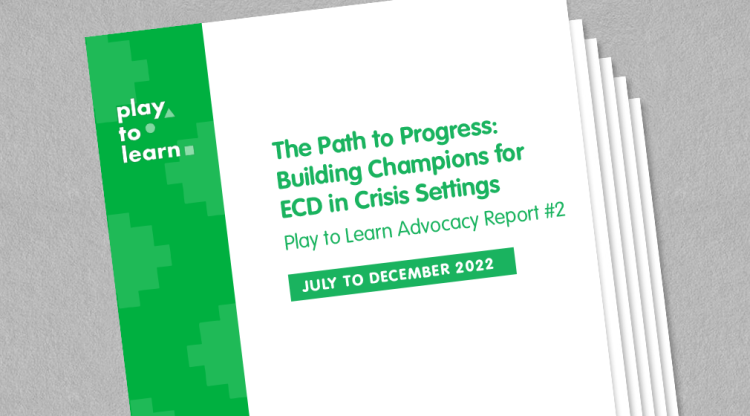
The Path to Progress: Building Champions for ECD
This report tells the story of how Play to Learn has collaborated with champions to advocate for the prioritization of young children in humanitarian contexts.
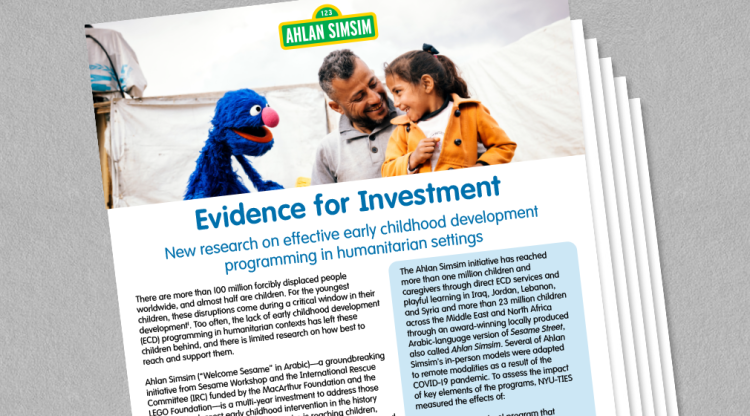
Evidence for Investment
Research from NYU Global TIES for Children on the Ahlan Simsim program demonstrates the power of delivering ECD opportunities to children in crisis-affected contexts. This handout summarizes key findings and implications for future programming.
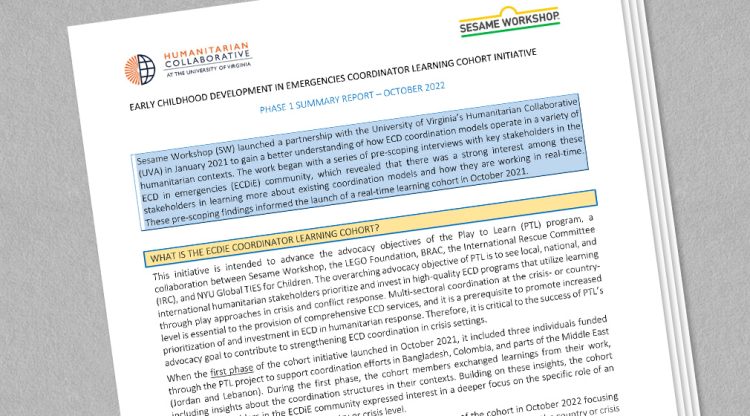
Learnings from ECDiE Coordinator Cohort Phase 1
During its first phase, the ECDiE Coordinator Cohort brought together individuals supporting ECD coordination in Bangladesh, Colombia, Jordan, and Lebanon.
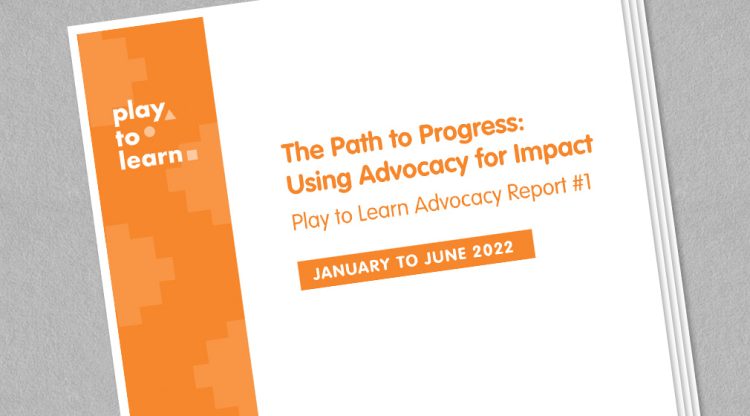
The Path to Progress: Using Advocacy for Impact
This report tells the story of Play to Learn advocacy accomplishments, highlighting successes as well as tactics and intermediate progress made along the way.
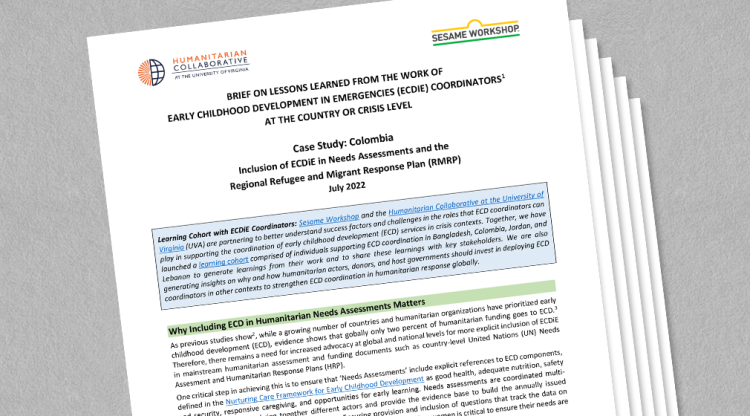
Learnings Brief: Needs Assessments and Response Plans
This brief from the ECDiE Coordinator Cohort offers lessons learned for strengthening inclusion of ECD in mainstream humanitarian needs assessments and response plans at the country or crisis level.
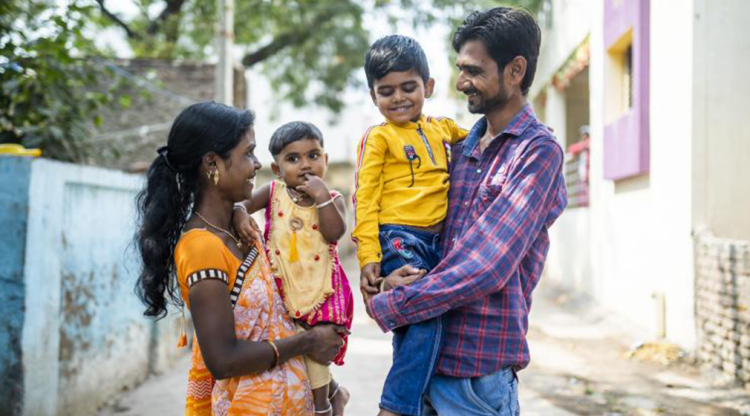
Caring for the Caregivers: The Key to Thriving Families
Supporting children means supporting caregivers, too. This blog, co-written with UNICEF, demonstrates how ECD programs can serve the mental health needs of the whole family.
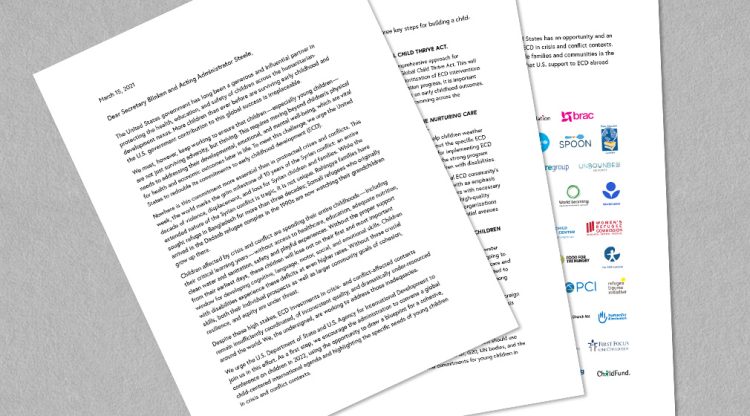
Implementing the Thrive Act
Sesame Workshop led a call, joined by dozens of organizations, that urges US government officials to continue their leadership on ECD.
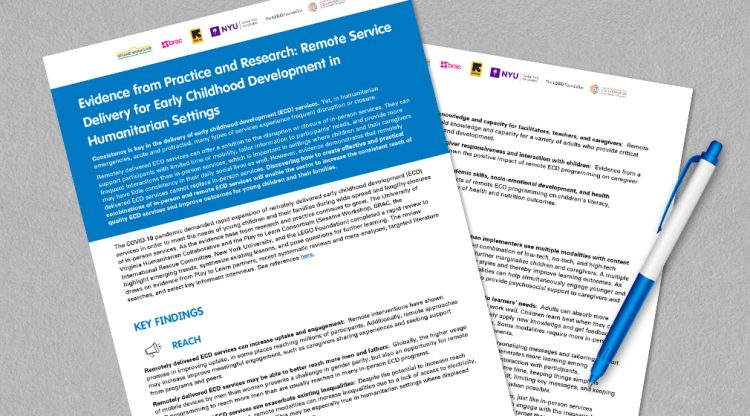
Remote Service Delivery (The Evidence)
This handout summarizes a rapid evidence review of evidence on reach, impact, and implementation of remotely delivered ECD interventions in crisis and conflict settings.
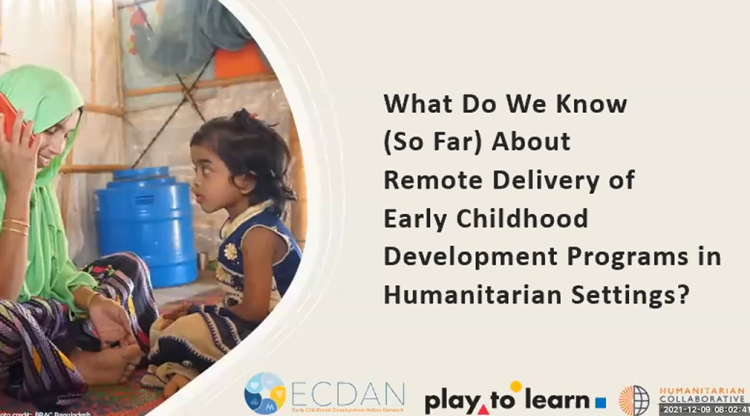
Remote Service Delivery (A Discussion)
Researchers and practitioners discussed evidence on using remote modalities on using remote modalities to deliver ECD interventions in crisis and conflict settings.
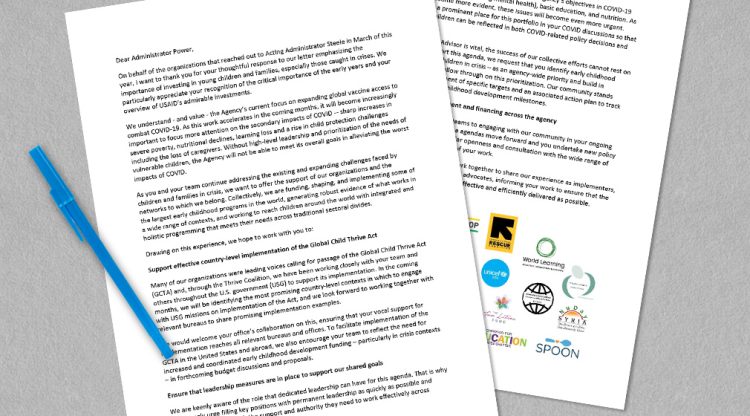
An Ongoing Dialogue
Following the USAID response to our coalition letter, Sesame Workshop and partners shared our three priorities for ECDiE.
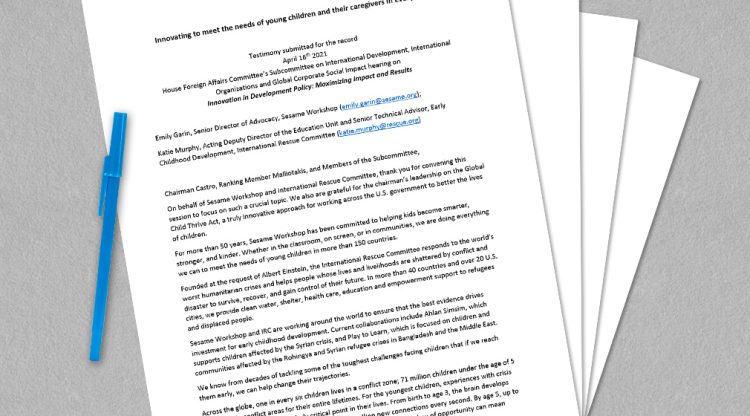
Congressional Testimony
Sesame Workshop and the IRC submitted testimony for a US House Foreign Affairs Committee Subcommittee hearing on innovation in development policy.
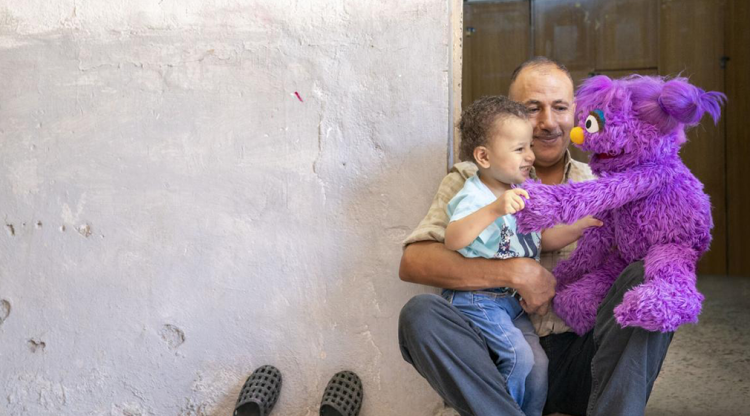
Supporting Caregivers in Playful Learning at Home
Sesame Workshop and partners share five key takeaways from their work to support refugee parents during the COVID-19 pandemic.
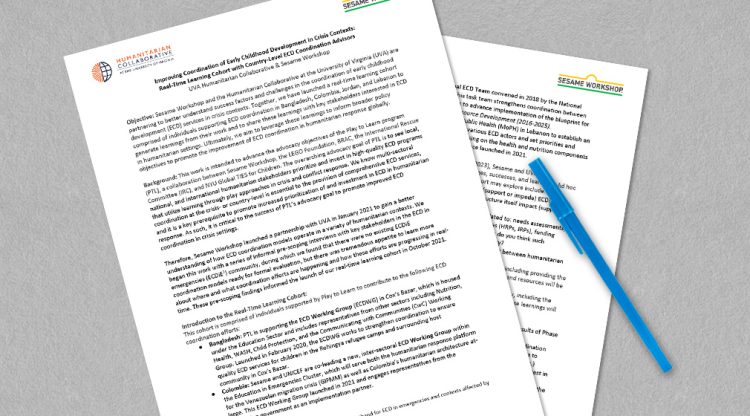
Better Together
Sesame Workshop and partners are working across geographies to understand what works for coordinating ECD interventions at a crisis-level.
Sesame is proud to be a member of the following networks: The Early Childhood Development Action Network (ECDAN), the Moving Minds Alliance (MMA), the Early Childhood Peace Consortium (ECPC), the Inter-Agency Network for Education in Emergencies (INEE), and the Thrive Coalition.
